
Lay it on the line
By George Guidoni, Editor
Automation Palletizing beer Molson Coors packagingCanada’s largest beer plant transforms its end-of-line packaging capabilities with a high-tech palletizing systems upgrade
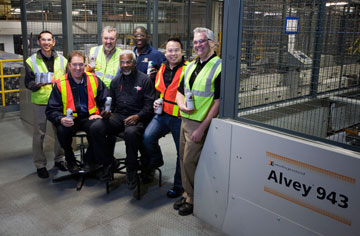
From left: Molson Coors Canada’s packaging team leader Tan Le, Toronto brewery manager Benoit Maillette, Toronto brewery director of packaging Jeff Nancekivell, palletizer operator Lawrence Fenton, palletizer operator Donald Gregory, corporate engineer Nicholas Chan, and packaging maintenance team leader Brent Pritchard strike a cheerful pose in front of one of the two fully-automatic Alvey 943 palletizing workcells started up at the Toronto Brewery’s canning line last fall.
Turning the Big 5-0 is often considered to be a pivotal milestone in many people’s lives, and it is not all that different for an iconic industrial institution such as the Molson Coors Canada brewery in west-end Toronto.
But whereas passing the half-century mark is not always celebrated with unrestrained joy by everyone making it to the big jubilee date, there is more than just a little anniversary excitement buzzing through the country’s largest beer production facility these days—in large part thanks to some outstanding recent capital investment upgrades initiated to bring the plant’s manufacturing prowess up to par to world-class manufacturing standards.
Earlier this year, the plant embarked on a major production expansion with the arrival of six new, gigantic stainless-steel brewing vats to the sprawling Molson Coors Canada complex boasting over a million square feet of production space—requiring a massive logistical and transportation feat to deliver the massive tanks from Germany—in an estimated $24-million investment that will boost the plant’s annual capacity well above its current 4.3-million-hectoliter output just in time for the next peak season in mid-spring.
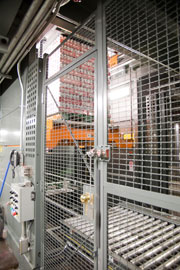
An elevator moves a full-pallet load of Molson Coors beer cans from the Alvey 943 palletizer on the upper level down to the stretchwrapping station.
But while the imposing convoy of supersized tanks being trucked onto the 54-acre site made for some great photo opportunities for local daily newspapers early last month, there were also some less-publicized, but equally important strategic investments being carried out at the plant—employing 500 to 700 full-time people throughout the course of the year—to make it a more efficient, world-class operation.
One of those key investments, implemented throughout the course of last year, centered around the canning line installation of two brand-new Alvey 943 automatic palletizing stations manufactured by leading end-of-line packaging and material handling systems supplier Intelligrated of St. Louis, Mo., with its Intelligrated Limited subsidiary in Oshawa, Ont., playing a key role in the project’s successful and timely execution.
According to the Toronto Brewery manager Benoit Maillette, the canning line’s previously-employed palletizers—originally installed back during the 1970s—simply became too slow to keep up with the ever-growing volumes of canned beer production at the facility, while their old-fashioned design and operational drawbacks were also deemed to be a hindrance to the plant’s occupational safety standards and objectives.
Safe Bet
“We had some safety concerns with our previous palletizers, which didn’t protect our employees as well as we wanted to, and that was the prime driver behind us investing in new palletizers,” Maillette told Canadian Packaging on a recent visit to the Molson Coors Canada’s Toronto Brewery operation, which is now producing an increasing number of its stalwart flagship beer labels like Molson Canadian, Molson Export, Molson M, Coors Light, Carling, Rickard’s and others in aluminum cans to respond to the consumers’ growing preference for the canned format.
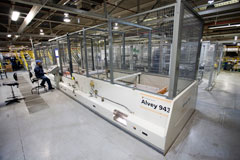
Palletizer operator Laurence Fenton chooses one of a multitude of palletizing patterns programmed into the fully-automatic, PLC-controlled Alvey 943 palletizers using the system’s operator-friendly touchscreen Allen-Bradley human-machine interface panel.
“In 2011 we will be producing the largest volume that this brewery has ever produced in its history,” Maillette explains, “and with the canning line being the centerpiece of that production expansion for us here in Toronto, we needed to invest in some reliable palletizing equipment that would be easy to operate, easy to maintain and, above all, be reliable.”
With the plant’s canning line fillers capable of reaching breathtaking speeds of 1,600 cans per minute, Maillette relates, any new palletizers would have to be high-capacity, high-throughput systems that would keep up with the plant’s anticipated production growth well into the future, while being operator-friendly and accommodating to the plant’s rigorously applied work safety standards.
“We are currently in the process establishing a world-class manufacturing here at the Toronto brewery,” he says, “and the new palletizers would really have to fit the bill for us on that account.
“Our can production volumes are really growing here in a big way—in the last couple of years we have seen double-digit growth in cans, as consumers seem to be attracted by the perceived convenience of the can format, as well as its attractiveness in terms of being able to use packaging graphics to a fuller visual effect,” reflects Maillette, who has been with Molson Coors Canada in various progressive capacities for 21 years.
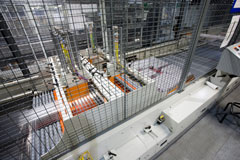
The fully-automatic, high-throughput Alvey 943 palletizers started up last fall have enabled the canning line to nearly double its throughput of 12-pack cases from 105 to 190 cases per minute, while virtually eliminating all product waste and damage in the palletizing area of the plant.
“That growth alone has made it worthwhile for us to see how we can match it on the production floor, in terms of adding more capacity and improving our ability to handle the greater volumes—it’s really a matter of responding to where the market demand is going right now in a timely fashion,” relates Maillette, citing “automatic product changeover capability” as one of the main performance criteria that any new palletizing systems would have to address.
According to Maillette, the Toronto brewery first approached Intelligrated in late 2008 to see if it could retrofit the plant’s existing six old palletizers to upgrade their speeds and flexibility, but it soon became apparent that the machines were quickly nearing the end of their useful service-life expectancy.
New Dawn
Once it was established that the plant would be better-served with an installation of new-generation, automatic palletizing equipment, Maillette recalls, Molson Coors Canada opened up its request for proposals process to five different palletizing systems suppliers—giving each bid careful consideration.
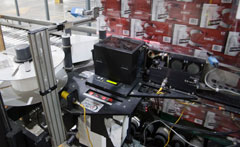
A high-speed SATO labeling-applicating system is used to generate detailed product information labels for the passing palletized loads of stacked cases of canned beer.
“The project was really put into full swing in the latter part of 2009 after we had put together a comprehensive business case and cost justification,” he recalls.
“We did a full vendor evaluation, outlined our specifications, identified and established certain ‘success factors’ that would have to be met, and issued a request for proposals.
“Simplicity was a big factor for us: we really didn’t want to have to play with fancy complicated robotics,” Maillette recounts. “In all our discussions with our tradespeople, electricians and operators we all agreed that we wanted something simple and reliable, something that would work with simple knob-turners, and that is what we ultimately agreed on.
“And after going out and seeing some Intelligrated palletizing systems working at other manufacturing facilities, and also seeing it in demonstration at the Intelligrated headquarters in St. Louis, we ultimately agreed that the Alvey 943 palletizers would be the right solution for us.
“My one big request was that if we were going to install something new, we would want to have everyone here, across all the different levels and all the different job functions, to be fully behind the decision,” he recounts, “which is why we took our time evaluating all our choices: feature by feature and option by option.
“That’s the approach that we took, and I think that’s what is really behind the success of this installation,” Maillette states.
“By the time we chose to go with Intelligrated soon after our visit to St. Louis last July, it was pretty much a unanimous decision.”
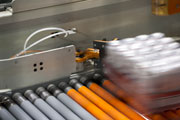
A close-up view of Intelligrated’s ‘soft touch’ product turning technology incorporated into the Alvey 943 palletizers.
It was a decision that has already provided outstanding performance improvements at the plant’s end-of-line packaging operations, such as catapulting its throughput from 105 to 190 cases per minute, while replacing the previous six palletizers with just two well-designed, fully-automatic, high-performance Alvey 943 palletizing cells installed on the plant’s upper mezzanine for high-level entry operation.
Starting up shortly after the last Labour Day weekend, the Alvey palletizers also enabled valuable floorspace savings in the warehousing area, according to Maillette.
“Space-savings were definitely a part of the business case we made for this equipment, and the warehouse savings were about 1,000 pallet positions, just by recovering the old space that was taken up by the old six palletizers,” says Maillette, complimenting the Alvey palletizers’ impressive automatic changeover capabilities.
“Automatic changeovers was a key feature for us, and the new Alveys allow us to go from one palletizing pattern to another in about five minutes.
Adds the Toronto Brewery director of packaging Jeff Nancekivell: “That is very important for us, because at our peak times we make about 60 to 70 changes a week, so changeover times was critical to what we needed to do.
“Basically, the changeover process is now just pressing a button to do the product change, with the rest of the time used for doing a process check, a quality check, that sort of thing, but essentially it’s just a matter of selecting the right product and the right code and hitting the button, and all the feeding guides on the machine are changed in nine seconds or less,” Nancekivell enthuses.
“We are now running two can sizes, 138 SKUs (stock-keeping units), different packaging styles, shapes and sizes … so flexibility is absolutely critical,” he stresses.
“We run six-packs, 12-packs, 15-packs, 18-packs, 20-packs, 24-packs, 36-packs, double-stack 20s and double-stack 30s [and] this Alvey palletizer has the flexibility to do pretty much anything you want it to do for you.”
Equipped with Category 3 safety systems and powered by robust SEW-Eurodrive motors, the Alvey 943 palletizers are high-level entry, inline high- speed machines incorporating an 11-lane divider at the infeed with ‘soft touch’ case-turning capabilities, as well as low-friction apron plates and case transfers.
Controlled by an Allen-Bradley ControlLogix L62 model PLC (programmable logic controller) and monitored via an Allen-Bradley PanelView Plus 1000 color HMI (human-machine interface) terminal—both manufactured by Rockwell Automation—the new palletizers have had a profoundly positive impact on the plant’s palletizer operator Lawrence Fenton, a 34-year veteran of the Toronto brewery.
“I remember when I started working here and pushing beer cases around manually, so having this system installed is like getting an upgrade from driving a Volkswagen to a Rolls-Royce,” Fenton chuckles.
“The simplicity of this machine not only makes it nicer for the operator to work with, but also for our maintenance department guys by making it easy to resolve any issues that may arise.
“We used to have a fair bit of product shrinkage here when we were using the older, circa-1970s palletizers, but now the shrinkage is basically next to nothing with the new machines,” Fenton adds.
Maillette agrees that the palletizer’s ease of operation and programming, as well as an abundance of onboard safety devices and mechanisms, will make the two new Alvey 943 palletizers reliable workhorses for the Toronto brewery for at least the next 25 years.
“We essentially replaced six palletizers with two. Before we would typically have three palletizers running side-by-side, along with part pallets, and now it’s just one,” Maillette expands.
“Simplicity of the system, with no complicated robotics, was a big thing for us,” he reveals. “When we get into speeds that we get into on our lines, the complexity that you can get with the robotic systems can be overwhelming, and most robotic vendors just don’t have that much history in that 2,000 cans-per-minute territory.
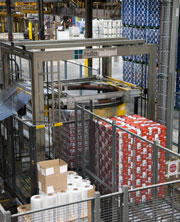
A towering rotary-ring Octopus strechwrapping system from ITW Muller is used to secure fast-growing volumes of canned product being produced at the Toronto Brewery.
“We thought about robotics, of course, but once we went out and saw this Alvey equipment operating at other installations, we really saw that this was the right solution for us,” states Maillette, while giving glowing praise to the top-notch technical assistance and customer service provided throughout the whole project by Intelligrated.
Team Spirit
“When we were selecting a vendor, the idea was to work in a real partnership,” Maillette recalls.
“Molson Coors Canada has a certain set of requirements that vendors have to respect, and we worked closely together to establish the performance criteria, the safety standards, the ergonomics, etc., right through the design process, followed by training, factory acceptance, calibrating … all before even getting the machines on-site.
“It was an exhaustive process and Intelligrated was just great to work with us through it all—especially when you consider that we haven’t bought new palletizers for cans here in Toronto since the 1970s,” he relates.
“Their follow-up service has been terrific too; we are working on some warranty items, just like with any other piece of new equipment, but we expect those to be wrapped up soon within a reasonable time-frame and with great attention to detail.”
Adds Fenton: “I haven’t seen an upgrade project carried out so smoothly in all my time here, and production-wise it has been running really well since the get-go.
“We were able to run it with the old palletizers during the changeover, to make it a shutdown-free, seamless transition,” he adds.
Says Intelligrated’s director of Canadian operations Geoffrey Bainton: “From the supplier’s point of view, we are obviously very excited to be reestablishing a relationship with Molson Coors.
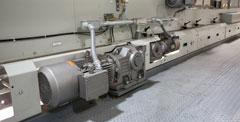
A series of heavy-duty motors manufactured by SEW-Eurodrive are used to power the Alvey 943 palletizing workcells.
“It was definitely one of the longest, most exhaustive and detailed installation projects for us,” Bainton recalls. “The amount of work that the Molson Coors Canada team did with us from prior to ordering and installation through the startup was staggering.
“But it was well worth it, as we avoided many of the installation and commissioning issues you would almost expect to encounter on a project this size, and the communication between the Molson team and the supplier was excellent, just top-class,” Bainton adds.
“They knew exactly what they wanted and they drove those requirements right through it all to our mutual satisfaction.”
Maillette agrees: “Usually you always have some ups and downs with any new project, but this was a very seamless transition, thanks to the effort of the entire team we put together here and the excellent support from Intelligrated.
“The guys on the floor who worked with our operators were very good to work with, and whenever our tradespeople would place a call for any sort of technical assistance, they would get full support from them, basically on a 24-hour basis,” he adds.
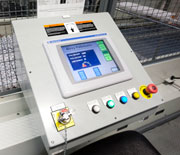
A close-up of the user-friendly Allen-Bradley PanelView Plus 1000 human-machine interface used to operate the Alvey 943.
“This may sound odd, but when I’m looking at any piece of equipment I’m looking not so much at the efficiency of the line, but rather the availability of the equipment,” Maillette reflects.
“If the equipment is available to me 95 per cent of the time to run, then I can focus on other areas to improve on the line,” he reasons.
“The packaging line is a linear operation, so when you get that one piece of equipment that is not running as well as the rest of the line, you’re not getting the efficiency you seek.
“Going to 190 cases per minute from 105 cases has obviously resolved the issue of us not having the sufficient equipment availability on the palletizing end to keep up with the production volume, and now I can turn my attention to the parts of the line that could be improved,” Maillette sums up.
“It is all about optimizing your equipment and your facilities to get full performance, and even though we have not gotten there yet, this palletizing upgrade has given us a good start by solving one very important piece of the puzzle.”
Photos by Sandra Strangemore
Advertisement

